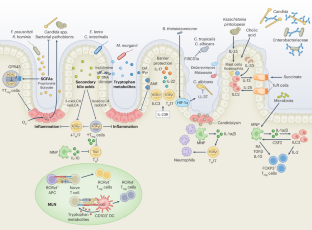Microbiota-mediated mechanisms of mucosal immunity across the lifespan
IF 27.6
1区 医学
Q1 IMMUNOLOGY
引用次数: 0
Abstract
The microbiota has a fundamental role in regulating homeostasis and inflammation across the barrier surfaces of the body. The gut is a unique bioreactor where the high concentration of microorganisms, microbial and dietary metabolites, microbial-derived molecular structures, immune cells, stroma and neurons form a complex, highly interactive and precisely regulated system. The mucosal immune system in the gut has profound local and systemic effects, influencing both health and disease. A critical period of immune imprinting occurs early in life, shaped by the neonatal microbiota and nutrition, to influence immune development and long-term disease susceptibility. Microbiota-derived metabolites have crucial roles in immune modulation, influencing epithelial integrity, oral tolerance and inflammatory responses. This Review explores the interactions between the microbiota and the mucosal immune system from infancy to adulthood, highlighting the impact on health and disease. We also discuss therapeutic interventions, including microbiota-derived molecules, dietary metabolites and emerging microbiome-based co-therapies. Here Iliev et al. review the interactions between the microbiota and the mucosal immune system from infancy to adulthood, highlighting the impact on health and disease.


微生物群介导的粘膜免疫机制贯穿整个生命周期
微生物群在调节机体屏障表面的体内平衡和炎症方面起着重要作用。肠道是一个独特的生物反应器,其中高浓度的微生物、微生物和膳食代谢物、微生物衍生的分子结构、免疫细胞、基质和神经元形成了一个复杂的、高度相互作用和精确调节的系统。肠道粘膜免疫系统具有深刻的局部和全身作用,影响健康和疾病。免疫印记的关键时期发生在生命早期,受新生儿微生物群和营养的影响,影响免疫发育和长期疾病易感性。微生物衍生的代谢物在免疫调节、影响上皮完整性、口服耐受性和炎症反应中起着至关重要的作用。这篇综述探讨了从婴儿期到成年期微生物群和粘膜免疫系统之间的相互作用,强调了对健康和疾病的影响。我们还讨论了治疗干预措施,包括微生物衍生分子,饮食代谢物和新兴的基于微生物的联合疗法。
本文章由计算机程序翻译,如有差异,请以英文原文为准。
求助全文
约1分钟内获得全文
求助全文
来源期刊

Nature Immunology
医学-免疫学
CiteScore
40.00
自引率
2.30%
发文量
248
审稿时长
4-8 weeks
期刊介绍:
Nature Immunology is a monthly journal that publishes the highest quality research in all areas of immunology. The editorial decisions are made by a team of full-time professional editors. The journal prioritizes work that provides translational and/or fundamental insight into the workings of the immune system. It covers a wide range of topics including innate immunity and inflammation, development, immune receptors, signaling and apoptosis, antigen presentation, gene regulation and recombination, cellular and systemic immunity, vaccines, immune tolerance, autoimmunity, tumor immunology, and microbial immunopathology. In addition to publishing significant original research, Nature Immunology also includes comments, News and Views, research highlights, matters arising from readers, and reviews of the literature. The journal serves as a major conduit of top-quality information for the immunology community.
 求助内容:
求助内容: 应助结果提醒方式:
应助结果提醒方式:


